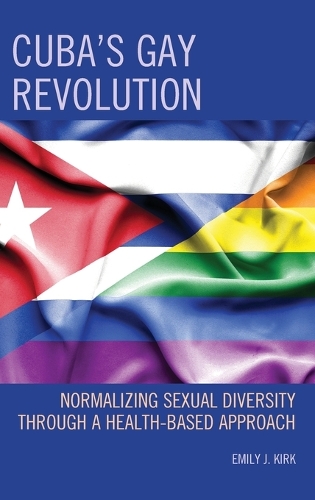
Cubas Gay Revolution: Normalizing Sexual Diversity Through a Health-Based Approach
(Hardback)
Publishing Details
Cubas Gay Revolution: Normalizing Sexual Diversity Through a Health-Based Approach
By (Author) Emily J. Kirk
Bloomsbury Publishing PLC
Lexington Books
15th August 2017
United States
Classifications
Professional and Scholarly
Non Fiction
306.76097291
Physical Properties
Hardback
182
Width 160mm, Height 239mm, Spine 21mm
463g
Description
Cubas Gay Revolution explores the unique health-based approach that was employed in Cuba to dramatically change attitudes and policies regarding sexual diversity (LGBTQ) since 1959. It examines leaders in the process to normalize sexual diversity, such as the Federation of Cuban Women (FMC) and the National Center of Sexual Education (CENESEX). This book is written for scholars interested in LGBTQ issues, Cuba, and Latin America.
Reviews
If ever a topic needed clarifying and objective analysis in our understanding of contemporary Cuba (so often the subject of distorting polemic), it is the subject of this invaluable study, whichwith its imaginative and astute focus on healthgoes to the heart of the often misunderstood but constantly evolving Cuban attitudes toward LGBT issues. As a result, we are given a genuinely fresh look at a much-contested subject, and one that seeks to locate it all within the ideological map of post-1959 Cuba. -- Antoni Kapcia, University of Nottingham
With her nuanced and thoughtful insights, extraordinarily well-informed perspective, and eloquent writing style, Kirks work will make an invaluable contribution to how scholars, students, and advocates think about issues of gender, sexuality, politics, and the evolution of the Cuban revolution. Emily J. Kirk is a scholar anyone interested in Cuba will want to keep an eye on now and for many years to come. -- Marguerite Rose Jimnez, Senior Associate for Cuba, Washington Office on Latin America (WOLA)
Emily J. Kirk provides Cuba scholars and others interested in sexuality studies with an artfully researched and argued exploration of when and how state policies and informal though broad-ranging national debates contributed to a dramatic evolution of attitudes about sexual preferences and rights after 1959. Central in the fascinating history of the normalization of sexual diversity she narrates are the framing of discrimination based on sexual preferences as a vital issue of individual and national health, the creation of CENESEX, and its ongoing role in orienting change in sexual diversity policies and real peoples practices, and the uniqueness of Cubas policy approach and successes. Kirks work shines! -- Sheryl L. Lutjens, California State University San Marcos
Author Bio
Emily J. Kirk is Social Sciences and Humanities Research Council (SSHRC) postdoctoral research fellow in the Department of International Development Studies at Dalhousie University.
